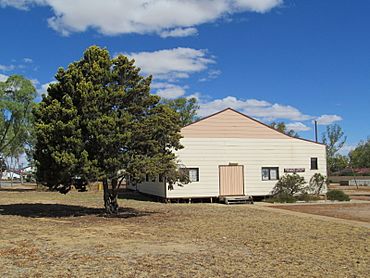Korrelocking, Western Australia facts for kids
Quick facts for kids KorrelockingWestern Australia |
|
|---|---|

Korrelocking town hall, 2013
|
|
| Established | 1911 |
| Postcode(s) | 6485 |
| Elevation | 343 m (1,125 ft) |
| Location |
|
| LGA(s) | Shire of Wyalkatchem |
| State electorate(s) | Central Wheatbelt |
| Federal Division(s) | Durack |
Korrelocking is a small town in the Wheatbelt region of Western Australia. It is located between the towns of Wyalkatchem and Trayning. In 2006, about 76 people lived in Korrelocking.
Contents
Discovering Korrelocking
Korrelocking is a quiet town in the middle of Western Australia's Wheatbelt. This area is known for growing a lot of wheat. The town is a short distance from the larger town of Wyalkatchem.
Early History of the Town
The idea for Korrelocking started when a railway line was being built. This line connected Merredin to Dowerin. Local people asked the government to create a town near the new railway station.
The town was officially named and recognized in 1911. This happened just before the railway line opened.
Farming and Grain Handling
In 1932, a group called the Wheat Pool of Western Australia made an important announcement. They said Korrelocking would get two special buildings called grain elevators. These elevators had engines and were built next to the railway tracks.
This made Korrelocking one of the first places in Western Australia to handle wheat in bulk. Instead of using bags, farmers could now store and move large amounts of wheat easily. This was a big step for farming in the region.
What's in a Name?
The name Korrelocking comes from an Aboriginal word. It refers to a water well that was found nearby when the area was first surveyed in 1892. The exact meaning of the name is not known today.
Nature and Wildlife
In 2012, a special event called a bioblitz took place near Korrelocking. A bioblitz is when scientists and volunteers work together to find and identify as many living things as possible in a specific area. This one happened in a bush reserve between Korrelocking and Wyalkatchem.
Fifty-four people joined in the bioblitz. They collected samples of many small creatures. These included scorpions, pseudoscorpions, isopods, spiders, and centipedes. They even found some species that were completely new to science!
 | James Van Der Zee |
 | Alma Thomas |
 | Ellis Wilson |
 | Margaret Taylor-Burroughs |


